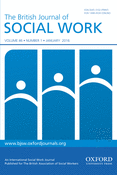-
Views
-
Cite
Cite
Yu-Te Huang, Rusty Souleymanov, Rethinking Epistemological Debates and Transnationalism of Sexuality between the West and Taiwan: Implications for Social Workers, The British Journal of Social Work, Volume 46, Issue 1, January 2016, Pages 98–114, https://doi.org/10.1093/bjsw/bcu067
Close - Share Icon Share
Abstract
The aim of this paper is to critically examine the social work profession's enactment of classifying a group of people as sexual minorities on the basis of the essentialist paradigm along with the Western-centred legacy of scholarship. To enhance epistemological acuity for social workers, the historical backdrop of, theoretical applications concerning, and the ongoing debate between essentialist and social constructionist approaches to sexuality are reviewed. We also conduct a transnational analysis of sexuality discourses by juxtaposing their development in the Western and Taiwanese academic scholarships to indicate the dynamics of colonisation/resistance in a non-Western context and the emerging trend of hybridity. Therefore, we underline social workers' epistemological reflexivity in practice, and further argue that an active engagement with history and alternative discursive lenses concerning sexual minority populations can lead social work practitioners and researchers to extend respect to this marginalised group in the global context.




